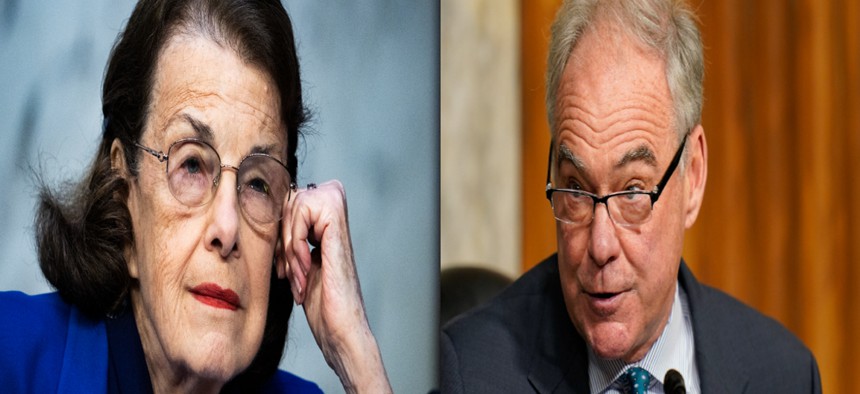
The senators want Congress to pass the Preventing a Patronage System Act. Tom Williams, CQ-Roll Call/Patrick Semansky/Getty Images
Sens. Feinstein and Kaine: Congress Must Act to Protect Federal Workers
The legislators argue that Congress needs to pass legislation that would prevent future presidents from replacing career, nonpartisan federal employees with political appointees.
Less than two weeks before Election Day 2020, former President Trump signed Executive Order 13957, a move to radically transform the federal government by replacing thousands of career, nonpartisan employees with political appointees.
The executive order made it easier to fire career experts by putting them into a new federal employment category called “Schedule F.” This new designation would remove long-standing protections from as many as 50,000 career workers, allowing them to be fired and replaced with political appointees.
Thankfully, President Biden rescinded that dangerous Executive Order during his first week in office, but there’s nothing stopping a future president from again trying to upend the federal government by firing experts and replacing them with thousands of political loyalists. In fact, former President Trump has indicated that if he is reelected, he would do exactly that.
We believe Congress should step up and pass our Preventing a Patronage System Act to make sure no future president – from either party – is able to singlehandedly strip away bedrock merit-based civil service protections. Our bill, which we also recently filed as an amendment to this year’s defense bill, would prevent any future president from reclassifying federal employee positions into this unprotected “Schedule F” category without the express approval of Congress.
The Trump administration didn’t hide its reasoning for Executive Order 13957: Former President Trump intended to fire tens of thousands of career civil servants – including nonpartisan national security experts, public health professionals and criminal prosecutors – and replace them with individuals who would do his bidding.
Career, nonpartisan federal employees are the backbone of our government, and our states of California and Virginia are each home to more than 140,000 civil servants. They carry out a range of important services, from mail delivery and disaster recovery to food safety inspection and Medicare, Social Security and VA benefits administration.
These employees hold a wealth of experience and institutional knowledge and are essential to ensuring continuity of government between presidential administrations. We rely daily on their unbiased and nonpartisan dedication to their jobs.
For decades, federal workers have been entitled to certain rights, including a competitive hiring process with veterans’ preference and rights protecting federal employees from being removed without cause. These rights ensure that our government remains effective, ethical and focused on working for the people.
If these career employees feel their jobs are dependent on the president’s politics, they may no longer speak out when they witness an illegal or unethical act for fear of being fired. It would be particularly dangerous at the Pentagon, for example, where partisan loyalty outweighing expertise could end up compromising national security in times of conflict – this is why we also filed our bill as an amendment to this year’s defense bill.
Removing nonpartisan experts could also mean disaster recovery efforts or emergency health supply distribution might be guided by political considerations rather than the greatest need. No American should fear that FEMA would fail to help in a crisis because they support one political party or another.
Firing large numbers of individuals who are familiar with our government’s processes would slow down or even halt many important federal services, at home and abroad.
There are areas where the federal government can be improved, but civil servants are a critical element in providing the substantive expertise and procedural knowhow to keep our system running.
The Trump administration suggested that Executive Order 13957 was needed to remove poor performers in the government, but there is already a system in place to do just that. Could that system work better? Perhaps. But the truth is that the Trump administration wanted the authority to fire every executive branch employee who didn’t show sufficient loyalty to former President Trump himself. There were even reports of databases being compiled with people loyal to Trump who could replace career federal workers.
Simply put, our career federal workforce needs to remain, at its core, nonpartisan and expertise-based. That is why it’s so important that we protect our merit-based federal workforce system by passing the Preventing a Patronage System Act, whether on its own or as part of this year’s defense bill.
The House has twice passed this bipartisan bill, and the Biden administration expressed its support. It’s now time for the Senate to follow suit.
NEXT STORY: GovExec Daily: Countdown to Open Season






